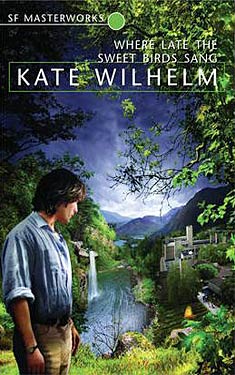Kate Wilhelm
Read 1/2013, reviewed 4/26/13, revised 11/7/2013
5 stars
This book is a great post-apocalyptic/dystopian future
novel. It is a variation on the “Brave
New World” themes of cloning, societal control, and personal rebellion. In this book, the clones rule an enclave
created by an extended family on the eve a nuclear war. But there are flaws with the creation of the
clones, including the requiring of infusion of original DNA every few
generations, and a crippling emotional need to be close to one’s clone
siblings. One non-clone, Mark, is born
and becomes an outcast and potential savior of the human race.
 The environment is another major theme in the book. This is the first reference that I’ve come
across in literature where the concept of nuclear winter is discussed. Popularized by Carl Sagan and sensationalized
by popular media, it dominated our cold war nightmares in the ‘70s and ‘80s. Many popular books and movies about nuclear
war depicted the radioactive devastation in the aftermath of such a war. Instead of the radioactive desert, Wilhelm
explores the shortening of the summer and the advancement of the glaciers.
The environment is another major theme in the book. This is the first reference that I’ve come
across in literature where the concept of nuclear winter is discussed. Popularized by Carl Sagan and sensationalized
by popular media, it dominated our cold war nightmares in the ‘70s and ‘80s. Many popular books and movies about nuclear
war depicted the radioactive devastation in the aftermath of such a war. Instead of the radioactive desert, Wilhelm
explores the shortening of the summer and the advancement of the glaciers.
Wilhelm uses the forest almost as character of its own. She creates a contrast between the
relationship between the clone society and the forest surrounding it versus
Mark’s relationship with the forest. One
sees it as oppressive and terrifying, the other sees it as friend and
refuge. Despite the fact that this book
was written during the early days of environmentalism, I think she accurately forecasted the backlash against it, which came later in the Reagan and Watt era of
the destruction of the American forests.
Mark’s relationship with the forest made me think of the themes of the
film “Silent Running” and the song “Boy from the Country” by Michael Martin
Murphy.
Wilhelm, who I had never heard of before my Hugo quest, is a
master of setting mood. This is one of
those books that put me in a completely different head space. Every time I picked up the book, I was immediately
transported into its environment, the uneasy, false eden as seen through the desperate other, who
is rebelling against the conformity of the society. It speaks to everyone who feels different.
I was surprised and thoroughly satisfied by this book. I would go so far as to say this is an unsung,
forgotten classic of SF. I give this
book a 5 star rating, where 5 stars is only awarded when I find a book so
powerful and moving, it stands far above other great books.
No comments:
Post a Comment